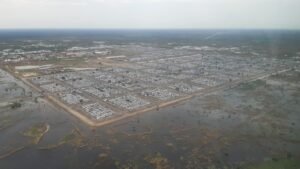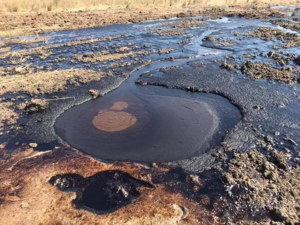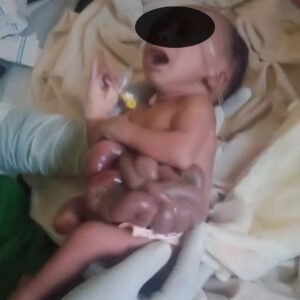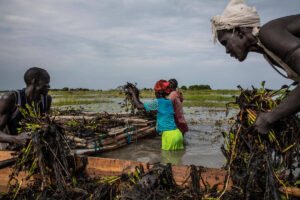By Matik Kueth
In the waterlogged swamps and flooded lowlands of Koch County in Unity State, South Sudan, a silent crisis unfolds with each rainy season.
What was once a predictable cycle of rain has now morphed into a toxic nightmare, a deadly mix of uncontrolled flooding and widespread oil pollution that’s endangering lives and polluting the land.
As flood rivers submerged villages, the waters combine with oil waste from the Rier (Tharjath) oil field in Koch, creating dangerous slicks that encompass communities.
For the locals, especially those who live on the village’s swampy fringes, these floods not only cause displacement; they also spread pollution, disease, and misery.
Dr. James Tut Riak, Koch County’s Health Director, has witnessed the scope of the mounting disaster, cautioning that the effects of oil pollution are tragically affecting the locals, amid the rainy season, exacerbating the situation.
He explained that local oil companies operating in the area have consistently failed to manage industrial waste properly, further compounding the environmental degradation.
“We are witnessing an unprecedented rise in birth deformities, many of which we believe are linked to environmental pollution. The flooding during the rainy season disperses oil and other toxic substances into our water sources, which are then consumed by our communities. This has long-term health implications, especially for mothers and children,” Riak stated in an interview with King Media on Wednesday.
“I’m sure this is the reason why people have been experiencing such cases in all our oil facilities. When you go there every week, you will experience a lot of things like miscarriage or abortion,” he added, emphasizing the critical need for immediate action.
According to him, 18 deformity cases have been registered between January and June 2025.
“This issue is serious and needs attention. This year, between January and June, we have recorded at least 16 babies born with defects and two calves, making it 18. So, among these three babies, one has died and some are still alive but in a severe condition,” he revealed.
As flooding worsens year after year because of climate change and lax environmental regulations, the county’s women find themselves at the core of this disaster, carrying the physical and emotional burden of a toxic environment.

Aerial view of Unity State [Photo: Courtesy]
Nyaluak Koang, 39, a mother of four, sits on a makeshift wooden bench beside her hut, her face etched with exhaustion.
As she narrates her experience, her voice trembles with concern, asserting that rainfall rises during the rainy season and fears that the tainted water could harm them because they rely on swampy waters for drinking and cooking, and had already lost one deformed child in 2024.
She stressed that whenever she fetched water from the streams and found oil particles floating on the surface, she had no choice but to scoop around them to fill her jerrycan.
“During the rains, the water rises so high that we cannot reach the clean water sources, mixing with the already flooded water that has submerged the area. We have to fetch water from the swampy waters, but I fear what we are drinking might harm my children because last year [2024], I lost my baby because of the water we drank from. I see something black like oil floating on the surface. How can we survive like this?” Nyaluak said.
Nyaluak’s fears are not unfounded; the flooding in Koch has become a breeding ground for environmental hazards, spills from oil-producing companies in Rier, Tharjath oil field has contaminated the water bodies.
These slicks float on the surface, blending with the murky floodwaters, often indistinguishable to the villagers who rely on these waters for drinking, cooking, and washing.

Oil spill in the Tharjath oil Field, Koch County, Unity State [Photo: Courtesy]
She stated that the residents had urged the government to build boreholes for them in the areas, but nothing has been done.
“After giving birth to a child, I noticed he was born with deformities. The doctors say it could be because of the water we drink, but what choice do we have? When the flooding comes, the water is all we can find. We have told the people in the government that we need boreholes, but they have not said anything since 2022,” she explains.
Nyemai’s words echo a grim reality faced by many mothers in the area, since little has changed despite their appeal to the state government.
Another resident, Nyariech Bath, a 37-year-old mother of six, has lost two children to mysterious deformities and illnesses that are connected to contaminated water.
“When floods come, I have no choice but to drink from the swampy waters. My children fall sick, and some are born with deformities that we have never seen before. It is as if the land and water are fighting us. I lost one baby born with defects last year [2024] and in April this year [2025], I lost another one,” she lamented.
Nyariech admits that when babies are born with defects, most mothers opt not to report the instances to the health center and instead bury them secretly at home, as many of these tragedies are never recorded in official statistics.
Environmental collapse
Meanwhile, Riek Bidiet Thowath, 57, a Paramount Chief of Pakur Payam, pointed out that the situation is deteriorating since the population depends mainly on swampy waters for cooking and drinking.
He echoed Nyariech’s sentiments, revealing that most of the women in Koch often give birth at home, but they resort to burying the young ones upon discovering that the babies have defects.
Thowath asserted that the locals were unable to farm since the land was submerged by flooded waters, making it difficult for them to sow crops, and women resorted to picking water lilies for survival.
“Our people have lived here for generations, and we have always depended on our land and water. But now, these resources are no longer safe. The flood waters are everywhere, and people cannot cultivate. We only depend on water lilies and fish,” he emphasized.
The paramount chief said that attempts to ensure women deliver in hospitals have faced resistance.
He attributed the increasing cases of deformities to climate change and water pollution from oil wastes, where toxic chemicals contaminate the water.

A photo showing a child born with a deformity (Photo: Courtesy)
“People are dying in their homes; we have seen a lot of deformed infants, and our animals are dying. The oil produced here, which has a lot of waste pits, is the major cause of these defects. Women are not even able to get pregnant because the water they drink is polluted,” he stressed.
The chief further appealed to the government to come up with strong legislation to halt pollution and protect the environment in oil-producing states.
“We are organizing local patrols to monitor illegal oil activities and raising awareness about the health risks of drinking contaminated water. We hope that by working together, we can find solutions to safeguard our future. We are not just fighting the floodwaters or the oil spills; we are fighting for our future, for our children’s health, and for the dignity of our people. We must act now, before it is too late,” he stated.
Wider environmental impact
Garang Maguet, founder of Green South Sudan and an environmentalist, contextualized the broader ecological implications, warning of long-term damage.
“Oil and gas have great effects on local lives. It affects the soil profiles when most of the leaking pipes or broken pipes drip into the soil, hence affecting the soil health and productivity. Some of the chemicals are eaten up in the foodstuffs, especially the meats of animals that have eaten the contaminated grasses, hence affecting the digestive system,” he said.
He stressed that pollution from oil-producing businesses is damaging respiratory systems.
“Due to the rate of pollution from contaminated water, most children are born deformed because of most of the pollutants. Most of our fishing communities depend on some natural resources like. Once they eat poison fish, the chemical can also be taken,” he explains.
He said that one of the most long-lasting effects of uncontrolled oil waste is on the mating cycle of most aquatic animals.
The environmentalist appealed for immediate environmental reforms, tighter restrictions for oil firms, and community education about the dangers of contaminated water.
“The company should carry out environmental Risk assessment before the commencement of any environmental project,” he urged.
However, when contacted by King Media, Gatwech Biphal, Unity State’s Information Minister, declined to comment on the worsening environmental and public health conditions caused by the annual mixing of floodwaters with oil waste.
According to the IGAD Climate Prediction and Applications Centre (ICPAC), there will be 55% above-average rainfall across the Greater Horn of Africa, including South Sudan from June to September, where one of its ten states, Unity State, is heavily flooded.
Koch County alone records more than 40 cases of birth abnormalities and infant mortality every year, directly linked to environmental problems aggravated by the rainy season, according to Riak.
The area’s tragedy is not isolated; it is a microcosm of the deadly intersection between climate change, persistent oil spills and industrial negligence, and governmental inaction.
For the last four years, since 2020, Koch County, along with the other counties in Unity State, including Mayom, Mayiandit, Panyijiar, Rubkona, Leer, and Guit, has been swamped by catastrophic flooding. This has displaced people, destroyed trees, killed livestock, animals, and affected crops. The residents rely solely on foraging for water lilies.

A photo of women harvesting water lilies in swampy parts of Nhier village [Photo: Courtesy].
It has also caused accounts of “alarming” birth defects, miscarriages, and other health problems among residents of the region and soldiers who have been stationed there.
Despite a constitutionally mandated 3% allocation of oil revenue for community development in the oil-producing state [Unity State], no significant initiatives have been implemented since South Sudan’s independence in 2011.



![An aerial view of Koch County, Unity State [Photo Courtesy] (1)](https://kingmediassd.com/wp-content/uploads/2025/07/An-aerial-view-of-Koch-County-Unity-State-Photo-Courtesy-1.jpg)